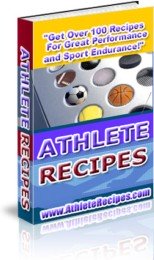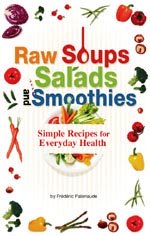|
Home :Sports Diet: Athelte Nutrition
HEALTHY DIET FOR ATHLETES Having inflammation of the joints can be one of the most discomforting experiences, especially for athletes who must always keep in top physical shape. The life style of the athlete that combines high level of physical exertion and high level of energy consumption can cause inflammation and the wear of the joints and tissues. Although taking anti-inflammation medicine will help, the best approach should be through natural means and a good healthy diet for athletes. Several recent studies suggest that through a controlled sports diet, it may be possible to reduce inflammation cases in athletes. Dr. Perricone has some great books that help to reduce inflammation through the diet. REDUCING INFLAMATION Healthy Diet for Athletes
One rule that you must adhere to is staying hydrated. You should drink 8 to 10 glasses of water every day at a minimum. You need much more if you are sweating heavily. Proper hydration is essential in the healthy diet for athletes. Water is the natural element in our daily body processes and consuming the required amount of water will help the athlete’s body to purify itself of toxins in the body. Although the process of inflammation is complex and dependent on many factors, research shows that accumulation of toxins in the body will aggravate inflammation more. In addition, an athlete should take care to consume olive oil and not use any saturated fats like butter or Canola oil. Olive oil has been shown to be both a non-saturated fat and an antioxidant agent that has been known to reduce cholesterol and inflammation in the body. Thus you should use olive oil and you should avoid adding any fat to the food while cooking it. In salads, you should not use any salad dressing; but rather you should opt for a dip of olive oil and some lemon juice. Adding one tablespoon of olive oil and 1 cup of low fat yogurt 3 times per week is excellent for the diet. These acids are found in foods such as eggs, red meat and especially in organ foods like liver and kidneys. Arachadonic acid has been found to be a major aggravator of inflamed tissue and eating foods like liver is definitely linked to the amount of inflammation cases an athlete experiences. These have no place in the healthy diet for athletes. #4 Another thing that you have to watch out for is the sodium levels. Although athletes require a minimum amount of sodium everyday, recent studies show that increased levels of sodium in the blood stream will cause greater inflammation of the tissue compared to a low sodium diet. The concrete cause of this is still unknown, but it is probably dependent on the body’s transport and energy utilization mechanism. Don't mistake sodium for good salt however. Salt is considered a super food, but not ordinary table salt. Sea salt, or pink salt are wonderful additions to the healthy diet for athletes. An athlete needs about 1/2 t. per day. #5 In addition to elevated levels of sodium, also elevated levels of caffeine have been found to be a major aggravator of inflammation. Thus reducing your caffeine intake by lowering your coffee to 1 or at a maximum 2 cups per day will help greatly (and you will feel more energetic since caffeine deprivation can cause loss of performance in athletes if you are a caffeine addict). #6 Avoid refined white sugar as an athlete. Refined white sugar has been shown to be very detrimental and an aggregator of body inflammation. Even eating starchy foods can be detrimental, if not done in moderation. You should try to use natural sweet foods and only brown unrefined sugar if possible. #7 Excess protein can be a cause of inflammation as well. When you reduce the amount of protein in your diet, it eases the burden on the kidneys. Proteins such as whey are a much lighter load on the kidney as opposed to meat, especially red meat. These foods promote inflamation: (1) These foods are anti-inflammatory (2) Almonds, asparagus, avocado, beans (black, kidney, lima), apples, bell peppers, broccoli, broccoli Rabe, blueberries, blackberries, brussel sprouts, cabbage, cantaloupe, clams, cottage cheese, lowfat), crab meat, chicken (white meat), capon, cauliflower, celery, Chilean sea bass, cod fish, coriander, cucumbers, dill, egg whites, eggplant, endive, escarole, fat-free milk, feta cheese, fennel, flounder, filet of sole, garlic, grapefruit, ginger, halibut, honeydew melon, kiwi fruit, kale, legumes, lentil soup, lobster, lemons, leafy greens, lettuce, monkfish, mushrooms, mussels, nectarines, nuts, oatmeal, onions, olive oil, olives, parmesan cheese, peaches, pecans, parsley, pears, plums, radish, raspberries, spinach, scallops, Swiss chard, scallions, snow peas, smoked salmon, sardines, shrimp, salmon, salmon trout, soy beans, sour cream, swordfish, tea (black and especially green), tomatoes, tomato juice, tofu, turkey, yogurt, (non-fat, unflavored), walnuts, and zucchini.
Again, the concrete mechanism is not known, but recent studies show that it is also linked to the sodium transport mechanism in the blood stream. Of course, adjusting your exercise program, combined with proper dieting can help keep the inflammation cases down in an athlete. This can easily be part of a healthy diet for athletes and there are also several herbal supplement and remedies that you can take. The digestion of Ginger has also shown to have healing powers in the present case of inflammation and it also helps protect from possible recurrences of inflammation. You can find discounted ginger supplements at N101. If you are experiencing severe cases of tissue inflammation then taking substances like Tissue Rejuvenator (which can be found here from Hammer) daily has been shown to be quite effective in stopping tissue inflammation, even before it begins. I take Tissue Rejuvenator when I am racing and when injured. It has worked for me, by speeding recovery and helping with inflammation from racing long hours. Ingredients in Tissue Rejuvenator Chondroitin Sulfate: 500 mg MSM (Methylsulfonylmethane): 500 mg Enzyme Blend (peptidase and bromelain, papain, protease,amylase, lipase, cellulase, and phytase: 400 mg Boswellia Serrata: 400 mg Devils Claw: 200 mg Yucca Root: 100 mg Turmeric (Curcuma longa) Root Extract: 100 mg Quercetin (Saphora Japonica Source): 20 mg Undenatured Type II Collagen: 5 mg Other supplements recommended are CoQ10. Dr. Andrew Weil recommends 60-100 milligrams of a softgel form taken with your largest meal. The very best source of CoQ10 is from Premier Research Labs. However for a very good supplement and a better price try Dr. David Williams: Q 10. With proper exercise, anti-inflammation diets, and possibly a natural supplement you can live a life free of inflammation as an athlete! Bill D. Misner Ph.D. C.S.M.T., product developer and researcher for Hammer Nutrition. Jennie Brand-Miller, et al. The Glucose Revolution: The Authoritative Guide to the Glycemic Index, The Groundbreaking Medical Discovery (New York: Marlowe & Company). Dr. Bob Marshall, CCN, past president of the International and American Association of Clinical Nutritionists, founder of Premier Research Labs. |
Sign up for our Extreme Adventure FREE Sports-ZineExtreme Adventure Sports Zine |
 A healthy diet for athletes can change performance levels if you have pain and inflammation.
A healthy diet for athletes can change performance levels if you have pain and inflammation. #1 There are several guidelines to be followed as well as foods to be avoided in reducing inflammation.
#1 There are several guidelines to be followed as well as foods to be avoided in reducing inflammation. #3 There are of course, certain foods that must be avoided at all costs if you want to keep inflammation down. You must restrict your diet of any food stuffs that contain arachadonic acids.
#3 There are of course, certain foods that must be avoided at all costs if you want to keep inflammation down. You must restrict your diet of any food stuffs that contain arachadonic acids.
 Alcoholic beverages, bacon, bananas, breads, bagels, beef, beer, brandy, butter, breads, carrots, cream cheese, candy, cake, chocolate, cookies, cereals (except oatmeal), cornstarch, corn, corn syrup, croissants, dried fruit, duck, doughnuts, fruit juice, fried foods, flour, gin, grapes, goose, granola, hard cheese (except for feta and parmesan), honey, hot dogs, ice cream, jams and jellies, lamb, mango, margarine, molasses, mayonnaise, muffins, noodles, oranges pancakes, papaya, pastry, peas, pie, pizza, pasta, pickles, popcorn, pork, potatoes, pudding, pumpkin, raisins, relish, rice, rum, sherbet, soda, scones, sherry, sugar, tacos, veal, waffles, watermelon, whiskey, wine, whole milk
Alcoholic beverages, bacon, bananas, breads, bagels, beef, beer, brandy, butter, breads, carrots, cream cheese, candy, cake, chocolate, cookies, cereals (except oatmeal), cornstarch, corn, corn syrup, croissants, dried fruit, duck, doughnuts, fruit juice, fried foods, flour, gin, grapes, goose, granola, hard cheese (except for feta and parmesan), honey, hot dogs, ice cream, jams and jellies, lamb, mango, margarine, molasses, mayonnaise, muffins, noodles, oranges pancakes, papaya, pastry, peas, pie, pizza, pasta, pickles, popcorn, pork, potatoes, pudding, pumpkin, raisins, relish, rice, rum, sherbet, soda, scones, sherry, sugar, tacos, veal, waffles, watermelon, whiskey, wine, whole milk Of course, all the remedies mentioned above will be a partial help for reducing inflammation. Some medical journals also suggest that taking elevated levels of Vitamin D might also help reduce your chances of getting inflammation.
Of course, all the remedies mentioned above will be a partial help for reducing inflammation. Some medical journals also suggest that taking elevated levels of Vitamin D might also help reduce your chances of getting inflammation. Glucosamine Sulfate: 500 mg
Glucosamine Sulfate: 500 mg





